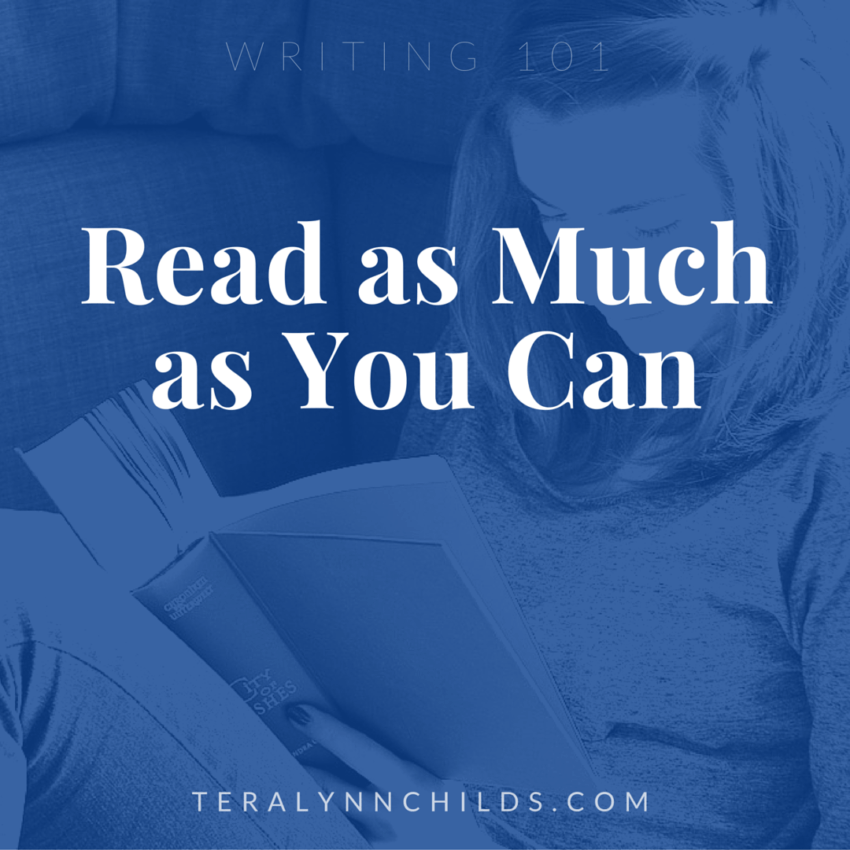If you’re an aspiring writer, chances are that you love to read. Right?
Well, I have good news. Because being a voracious reader is one of the critical first steps to becoming an author. Why? Let me tell you…
One of the most asked question that I—or probably all authors—get asked is, “Do you have any advice for aspiring writers?” And you know what? I do. I do have advice. Loads of it. More, probably, than anyone would ever want to hear. (Just get a writer talking about writing and you’d better pull up a chair.)
Okay, so if you’re looking for advice we might as well start at the beginning, before you ever put pen to paper or fingers to keyboard. Before your write a word of the story that’s churning around inside you, begging to be told.

Step One: Read as Much as You Can
One of the main reasons I started writing is because I was a ravenous reader. (I wasn’t always so keen on reading, but that’s a topic for another blog.) It was the inspiration I found in the words of others, of writers like Johanna Lindsey and Julia Quinn, Meg Cabot and Ellen Raskin, Agatha Christie and William Shakespeare. Their words, and the emotions they conveyed with those words, made me want to put together my own words and tell my own stories. To draw emotion from readers as those authors had drawn emotion from me.
But even more than inspiration, reading the writings of others–whether it’s the classics or romance novels or magazine articles or blog posts like this one–teaches you how that particular author uses words to convey emotion, thought, and action. Writing is kind of like trying to explain a dream to someone else. You’re taking something entirely inside your head and hoping that someone else will understand what you mean exactly. That kind of expression takes practice, but a great first step is studying how other writers use words to express their dreams. (This is what we call the author’s “voice”–which is just a vague way of saying “how you speak to readers”.)
Here are some great examples from authors with strong, unique voices:
- Two months ago I capitulated to nonconformity-conformity and had my hair bleached white and then dyed stop-sign red. It cost sixty dollars and it pissed off my mother, but it didn’t work. I’m still ordinary. ~ Fly on the Wall by E. Lockhart
- “There are even a couple of police here right this minute scouring the school for gas leaks, which includes my brother Brian ( I don’t mean my brother Brian is a gas leak, he’s a cop), so I’m hoping they’ll get to the lead in time and patch it up, maybe a bit of Blue Tack or chewing gum, whatever you do in an emergency. ~ The Year of Secret Assignments by Jaclyn Moriarty
- In the fall, a few brave souls sneak into the woods to harvest apples. But always in sight of the Meadow. Always close enough to run back to the safety of District 12 if trouble arises. “District Twelve. Where you can starve to death in safety,” I mutter. Then I glance quickly over my shoulder. Even here, even in the middle of nowhere, you worry someone might overhear you. ~ The Hunger Games by Suzanne Collins
- If there was a criminal escaping on water skis with a satchel full of priceless diamonds, I would certainly not chase after her in any way. What I would do is yawn and be glad that they weren’t my diamonds because for one thing, I don’t have any diamonds. My dad has a lot of valuable paintings, but if an evil crook carried them off across a tightrope, it would be no big deal because he’s a famous painter and he’d just paint some more. No death-defying pursuit necessary. ~ Lulu Dark Can See Through Walls by Bennett Madison
Read those passages (read those entire books, actually–and all of Jaclyn Moriarty’s blog, too, because she’s my hero) and study how those authors each use words in unique ways. No one could ever confuse a Jaclyn Moriarty book with an Suzanne Collins. Bennett Madison has a distinctly different voice from E. Lockhart. Why? How does their use of words create a completely different feeling, a different conversation between you, the reader, and the characters in the story?
This is a very important concept. A critical first step for an aspiring writer. Until you can figure out how they do it, there’s a pretty good chance that you won’t be able to.
Hugs,
TLC

I agreee whole heart-edly!!! Great post! Can't wait for the next part!
<3NIsha
Excellent post! 🙂
Interesting post! I have read all four of those books, actually, and it's interesting to see the passages all next to each other. Definitely very distinct voices!